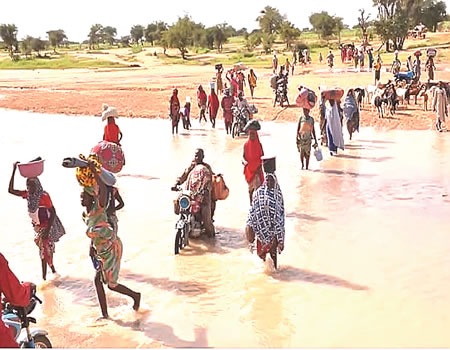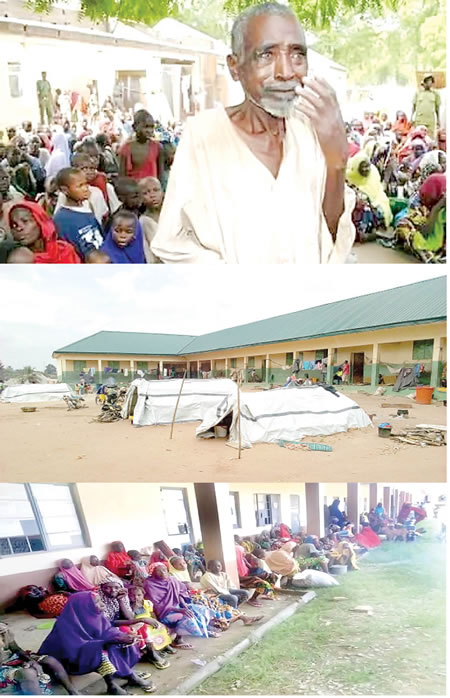A septuagenarian, Modu Bama, a former internally displaced person, told Saturday Tribune that he was once a big-time trader in the in the state before he lost everything to Boko Haram insurgents who, according to him, radicalised their young men and turned them against their parents, whom they slaughtered with glee.
Dashed hopes
Only a handful of the internally displaced persons and refugees from foreign countries can return home now, almost nine years after they arrived in the camps. Some of those who are still staying in the Dalori camps one and two said they were not happy with the way the government and the military were delaying their return to their respective villages.
“I am from one of the villages between Bama and Banki which has been completely destroyed by Boko Haram. How do they expect me to leave this place where I am being taken care of and become an IDP again in Bama?” said an IDP.
A military source confirmed that many of the villages between Bama and Banki were rigged with improvised explosives devices (IEDs) making it difficult for people to return home.
Emerging situations
The State Emergency Management Agency (SEMA), headed by Hajiya Yabawa Kolo, has been on its toes trying to key into the resettlement project of the government for the IDPs. Kolo told Saturday Tribune that there were moves to move more IDPs to their council areas but repair works in some of the council areas had to be completed before they could move in.
“For now, we are doing our best to keep the IDPs happy and we intend to maintain the strategies of the military which we agreed to be using while handling the IDPs. We still make sure that they get the food items due to them. The issue of proteins missing in their diets is a thing of the past as we are up to task in terms of condiments and our partners, the National Emergency Management Agency (NEMA), are doing theirs. She, however, dismissed allegations of diversion of items meant for the IDPs.
“We have a military official who supervises the handling of their foodstuffs. He leads the team which is charged with the supply of food and they go as far as Baga to supply foodstuffs to any place we have IDPs or NYSC camp,” she said.
Hajiya Kolo, in an interview, said: “As a woman, I understand what these people go through in search of firewood sometimes way into unsafe territories. And that is why I have tried to lift up an advocacy for the issue to be placed on the front burner. Some of them do not even see the firewood, they gather and dry cow dung and use it as energy for cooking like they do in Kala-Balge. We need to help them in that aspect, especially during the rainy season and we will do just that for them soon.”
Another persistent problem is that as the situation changes, the population in the camps fluctuates. United Nations sources have confirmed that there are no less than 65 new arrivals into Banki on a daily basis. Banki is about 58 kilometres from the local government headquarters of Bama and it takes tact for the humanitarian community on both sides of the international border to manage the influx.
“So, just when you think the food ration is enough, you discover you may have to provide for more mouths. So, as it is now, both agencies take care of nothing less than 96,200 Nigerian refugees in Cameroon, about 10,000 in Chad, and about 150,000 in Niger Republic. A sizable chunk of the expenses is handled by the refugee agencies on both sides of Lake Chad. Of course, a lot of female teenagers have suffered abuse by their male counterparts, making teenage pregnancy a common phenomenon in most of the IDP camps,” said Kolo.
Going back to their ancestral local governments is not an easy task as not all the councils overrun by Boko Haram have been resettled.
Councils whose original inhabitants can comfortably call themselves former IDPs are Bama, Konduga, Dikwa, Gwoza, Askira Uba, Nganze, Monguno, Gubio, Konduga, Jere, Gamboru Ngala, Mafa, Kaga and Kala Balge. However, Kukawa, Baga, Marte, Abadan have issues. Governor Kashim Shettima , at a joint news conference with the head of the humanitarian community, Edward Kallon, expressed regrets that targets for Abadan and Marte could not be reached because intelligence reports indicated that a thorough job had not been done yet by the military on the Lake Chad islands. “We do not want to rush the people down there and later discover that we have just exposed them to Boko Haram who may be using them as soft targets,” the governor said.
No fewer than 34 women have given birth at the Internally Displaced Persons (IDP) camp in Gandi, Rabah Local Government Area of Sokoto State.
The coordinator of the camp, Lawal Maidoki, who disclosed this in an interview in Sokoto recently, added that 54 other women were at different stages of pregnancy. He said the mothers and their babies are doing fine and the state government had resolved to take care of them for the period they will stay in the camps.
One of the women, who pleaded for anonymity, said that staying in the camp was not easy but thanked God for her safe delivery. She said she was doing fine as the government had provided for her soap, towel, blanket, sweater, drugs, among other things.
The camp deputy director, Ibrahim Ahmad Gandi, said the state government had provided all necessary facilities and logistics for the comfort of the persons in the camps. He listed the facilities to include water, temporary toilets, shelter, food, clothing, security and financial assistance. He disclosed that a temporary clinic, essential drugs and personnel were provided for the healthcare needs of the over 5,000 displaced persons in the camp.
However, Gandi expressed disappointment that some of the IDPs were selling the items provided for them such as bread and garri.
“Some have resorted to begging, in spite of the provisions made for their welfare by the government,” he said.
The resettlement efforts in Zamfara
Zamfara State has been a hotbed of banditry and cow rustling. More than 5,000 people have reportedly lost their lives with about 50,000 communities destroyed. Persistent killings have led to the displacement of about 21,000 people since the crisis started in the state in 2010.
The speaker of the state House of Assembly, Alhaji Sanusi Garba Rikiji, who is the chairman of the state government’s Relief and Damage Assessment Committee, while on an assessment tour of some affected villages in Zurmi, lamented the increasing number of IDPs in various camps across the state. He said the development did not augur well for the people.
“Today, some of these IDP camps are found in Shinkafi, Marudun, Tsafe and Zurmi local government areas of the state. However, recent findings revealed that there are no fewer than 5,000 internally displaced persons who have returned to their respective communities. This was made possible by the concerted effort put in place by both the state and federal governments,” the state governor, Alhaji Abdulaziz Yari, had said in a recent interview with newsmen. He said his government had spent over N13 billion to deal with the security situation in the state.
The Federal Government had deployed fighter jets in the trouble spots to dismantle the bandits’ camps located in the forests and findings showed that many of the bandits have been killed or dislodged in a recent onslaught by the Nigerian Air Force. About 20 bandits have been arrested and are currently helping security agents on their investigations.
Meanwhile, Governor Yari has ordered security agencies to ensure all IDPs in the state are evacuated to their respective homes within one week. He gave the order at a security meeting held in his hometown, Talata Marafa, Monday last week. The governor said since peace had returned to all the affected communities, there was no need for the IDPs to remain in the various camps across the state.
He added that the IDPs, when they return home, would not be left alone as security operatives would remain in all the affected communities for a while until peace is finally restored.
Yari said his administration was committed to ensuring that peace reigned in Zamfara State by fighting the bandits and other criminals to a standstill.
“This is a total war against the bandits and we must not allow anything to deter us from crushing the bad elements hurting and killing our people,” he said.
One of the victims currently in one of the IDP camps in Zurmi, Inuwa Rabe, said he was not keen on returning to his village, Jena. According to him, he escaped the hoodlums’ attack through divine intervention. He said the moment he started hearing gunshots, he gathered his wife and three children and ran away.
“We were in the bush. I don’t know where we were heading until we finally found a settlement belonging to a Fulani who offered to us a place to spend the night. He said life at the camp was not rosy as men were separated from their wives.
Another victim, Aminu Amiru from Mashema village, is still at a loss as to how he made it. He said among those who escaped “this pogrom” were pregnant women, some of whom gave birth in the bush and their babies washed with dirty water. He also said he left his animals, about 30 sheep, 12 chickens and five cows. “I really want to return to my village since I heard that the bandits have been killed. But how are we sure we will not be attacked again?” he said.
Unending trauma for Abuja IDPs
Internally displaced persons from Gwoza and Bama local government areas of Borno and Adamawa States, respectively, who have been taking shelter at Durumi, Area One in Abuja Municipal Area Council (AMAC), the nation’s capital, are still living through the trauma of their experiences about five years ago at the hands of insurgents.
There is no doubt that the 2,740 victims being sheltered in Durumi, Area One, in Abuja, had been subjected to hardship and other inhumane acts by Boko Haram insurgents in their various villages before eventually getting succour four years ago in one of the communities within the Federal Capital Territory (FCT), Abuja.
The dire living conditions of the 400 children, 300 women, 300 men, as well as thousands of young men and women who escaped the armed group’s violence in north-eastern Nigeria require an urgent attention.
The children there are attending a self-help school located within the camp premises. They have no access to formal basic education. The self-help school was established through the initiative of some of the IDPs. Many pupils do not bring food or money to school. The class is not conducive for learning. There are no books and not enough chairs. Some of the pupils, especially those in primary four and six, sat on mats and tarpaulin to receive instructions as there are no chairs. It is a terrible condition. Life there is tough and miserable. However, they prefer being there to going back to unsafe territories.
Despite the military offensive against Boko Haram, the terrorist group has continued to carry out deadly attacks in the North. President Muhammadu Buhari’s efforts to nip in the bud, the insecurity bedevilling major parts of the country, it is said, are being frustrated by the group.
Many people who were displaced by the violence have fled not just to other parts of the country but also to neighbouring states. In Abuja, some of the displaced persons told Saturday Tribune that Boko Haram insurgents abducted some of their family members almost four years ago.
The camp chairman, Ibrahim Hamidu, said the villages are not safe, hence the need to remain in Abuja pending the time normalcy would return to the warring communities.
“Not that we don’t want to go back home but Boko Haram are still killing our people. Our villages are not safe. We are not going until all the affected communities are confirmed safe,” he declared.
Although he commended the government and organisations who have been making donations for the displaced persons’ wellbeing, he pleaded with the government to always pay a working visit to the camps with a view to knowing their current condition.
Also speaking with Saturday Tribune, Amina Subairu, Adamu Buba as well as Ismaila Umar and Hamidu Buba, said the camp had received lots of support from different private organisations.
They, however, said some foundations which usually came around to assist them left left after a week or two.
“The problem is that most of them usually promise heaven and earth, but after they leave, we see no result. It was a foundation that built our classes. They were around for three months before they left.
Some makeshift structures in the school were also built by the Redeemed Christian Church of God (RCCG), the Muslim Women Society (MWS) and the Army Officers’ Wives Association (AOWA),” the trio said in their separate interviews with Saturday Tribune at the camp. About 15 shacks erected in the camp have become old and are falling apart.
It was learnt that most internally displaced persons try their luck in Abuja doing menial jobs, but only a few find work to make ends meet. Others depend on handouts from good Samaritans.
The camp chairman, Hamidu, said when the displaced persons arrived in the camp in 2014, the children just played around and parents were not glad.
According to him, we started this initiative of self-assisted school by ourselves. The school is about two years old and we have not received any government attention.
“There are many things we like the government to do for us. As a proper school, we should have a scheme of work and school registers to record the attendance of pupils. Also, we need textbooks. If you look at the children population, we don’t have sufficient furniture in our classes. We spread mats and tarpaulins for pupils to sit on,” he lamented.
When I grow up, I’d become a soldier and kill 1,000 Boko Haram terrorists –12-year-old IDP
A 12-year-old IDP from Gwoza in Borno State, Subairu, said: “It is true that some of us don’t have shoes or sandals to wear. When I grow up, I want to be a soldier. I want to be able to kill the Boko Haram terrorists. I want to kill at least 1,000 of them. We don’t have anything in our house here in the camp. I miss Gwoza. I miss my grandmother, my father and my other relations in Gwoza. I don’t have a school uniform. It is not easy coming to school without these things.”
Subairu, who was not finding school easy as a result of hunger, poor amenities and lack of care, appealed to the Federal Government to come to their aid.
Another 12-year-old, Aliyu Bakura, a primary five student who has three siblings in the school, while confirming the plight of the pupils, also begged the government to provide them with food, uniforms and sandals.
“During the break time, we have nothing to eat. We don’t eat anything throughout school hours. We have food at home, but it is not enough to bring to school. My father and mother are in the house. I have three brothers and a sister in the school. We are from the Bama Local Government Area of Borno State. My teachers teach me very well. I learn all the subjects. I want to become a doctor when I grow up. I want the government to help us. They should give us food, school uniforms and shoes,” he pleaded.
The Federal Government, in October 2016, announced its intention to embark on a National School Feeding Programme. The programme, which was inaugurated on June 9, 2016, cost the government more than N6 billion and was said to be a part of the Social Investment Plans of President Muhammadu Buhari’s administration.
The feeding programme was budgeted for 5.5 million pupils from primary one to primary three in 14 states.
‘Life is hard here’
Victims of herdsmen attacks in Benue State still live in pains, agony and perpetual fear seven months after, and this is to say the least.
Visits to two of the camps at Abagena and RCE Primary School, located in Makurdi and Guma local government areas of the state, respectively, revealed that the victims still live in pains, anguish and apprehension. Most of them have lost hope of returning to normal lives.
A purported plan to withdraw security men attached to the camps has further heightened tension.
Governor Samuel Ortom had raised the alarm that the police authorities were planning to withdraw their men from the eight designated camps scattered across the state. The alarm has been dismissed.
However, as of the time Saturday Tribune visited the Abagena and RCE Primary School camps, it was tales of woe as the inmates lamented what they called the lack of readiness by the Federal Government to end killings and allow them to return home.
The camp commandant at Abagena in Makurdi Local Government Area, Philip Usatse, said he and others had been in the camp since January. Usatse commended the state government, non-governmental organisations, religious bodies and public-spirited individuals for their contributions to the wellbeing of the IDPs. He, however, expressed sadness that the long stay of displaced persons had begun to take toll on them.
“Now, all the materials donated to us, particularly food items, have been exhausted. Living is now difficult but we have solace that our people can now access their farmland. That is why you didn’t see many able-bodied men as you entered the camp. They have all gone to their farms. But by 6.00 p.m., if you come back here, you will see them in their hundreds,” Usatse said.
Asked what he was missing, he said: “I cannot explain in details what I am missing but just imagine yourself being displaced from your home. So many things are absent. Is it my privacy or the peace at home?”
For Mrs Kuyila Joel, life in the IDP camp is not what anyone could wish for their enemy. Mrs Joel, who spoke through an interpreter, said: “I am not happy to be here. I never thought that our stay here would last more than a month but here we are, spending the seventh month in the camp. At times, I wonder what manner of country this is, where the government does not have respect for human lives.
“Being in a camp like this is like being in a prison. The only thing you enjoy is that you can move out but there is a limit to where you can go because killings have not stopped. That is why we are still here.”
The only thing in the mind of Mrs Joel is when she will return home to enjoy those things she has missed in the past seven months.
“The only thing I would love the government to do for me is to ensure my return home and ensure that I live in an atmosphere that is devoid of crisis,” Joel said.
For Mrs Doose Vulum, bringing up her child at the IDP camp is her major regret. “I was pregnant when the Fulanis attacked our village. I escaped by the whisker. I had my baby in the camp here. My wish is to return to our village,” Mrs Vulum said.







